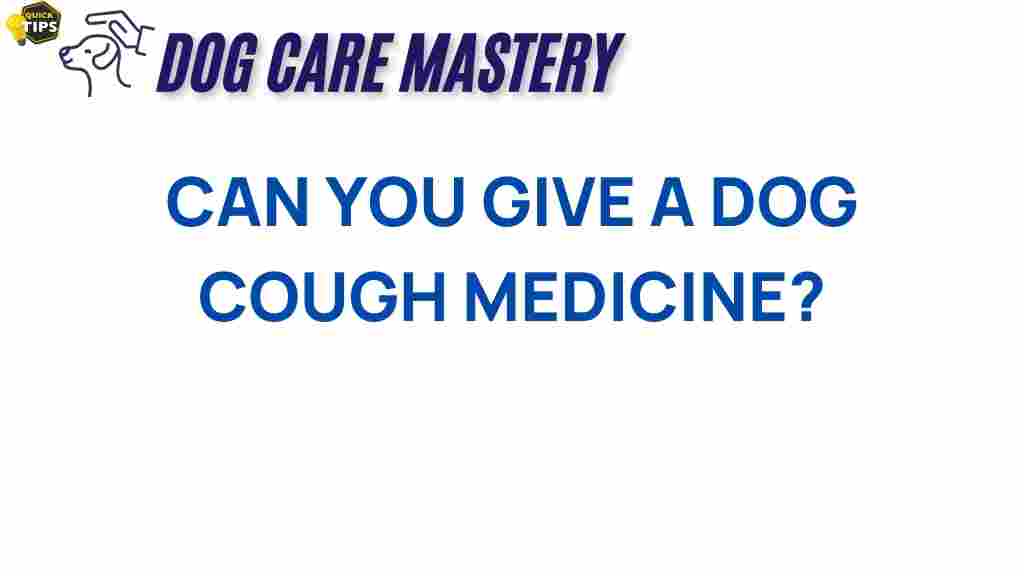Can You Safely Administer Cough Medicine to Your Dog?
As a dog owner, you want to ensure your furry companion is healthy and comfortable. When your dog is coughing, it can be concerning. You might wonder if you can safely administer cough medicine to your dog. In this article, we will explore the use of dog cough medicine, how to identify when to use it, and the steps to do so safely.
Understanding Coughing in Dogs
Coughing in dogs can be caused by various factors, including:
- Infections (viral or bacterial)
- Allergies
- Heart problems
- Foreign objects in the airway
- Chronic diseases
Before considering administering any medication, it’s crucial to understand the underlying cause of your dog’s cough. Consulting with a veterinarian is always the safest and most effective approach.
Types of Cough Medicine for Dogs
There are specific medications designed for dogs, often classified as:
- Antitussives: These suppress the cough reflex.
- Expectorants: These help clear mucus from the airways.
- Bronchodilators: These open the airways and ease breathing.
Human cough medicines are not safe for dogs and can be harmful. Always seek veterinary advice before giving any medication.
When Is It Appropriate to Use Dog Cough Medicine?
Consider using dog cough medicine when:
- The cough is persistent or worsening.
- Your dog shows signs of distress or discomfort.
- There are accompanying symptoms, such as lethargy, fever, or difficulty breathing.
If these conditions apply, contact your vet for a proper diagnosis and treatment plan.
Step-by-Step Process for Administering Cough Medicine to Your Dog
If your veterinarian prescribes cough medicine for your dog, follow these steps:
Step 1: Obtain the Prescription
Make sure you have a clear prescription from your veterinarian, specifying the type of medicine, dosage, and frequency.
Step 2: Read the Instructions
Carefully read the label and follow the instructions provided by your veterinarian or the medication’s packaging.
Step 3: Prepare the Medication
Measure the correct dosage using a syringe or dropper for liquid medications. For pills, you may need to crush them (if allowed) or use a pill pocket to make it easier for your dog to swallow.
Step 4: Administer the Medication
Gently hold your dog’s head and place the medication in the back of their throat, ensuring they swallow it. Reward them with praise or a treat afterward to make the experience positive.
Step 5: Monitor Your Dog
After administering the cough medicine, keep an eye on your dog for any adverse reactions or side effects. If you notice anything unusual, contact your veterinarian immediately.
Troubleshooting Tips
Sometimes, administering cough medicine can be tricky. Here are some tips to help:
- If your dog refuses to take the medication: Try disguising it in their favorite food or using a pill pocket.
- If your dog experiences side effects: Contact your veterinarian for advice on how to proceed. Common side effects can include vomiting, diarrhea, or lethargy.
- If the cough persists: Consult your veterinarian again; it may indicate a more serious condition requiring further treatment.
Alternative Remedies for Dog Cough
In addition to dog cough medicine, there are natural remedies that might help alleviate your dog’s cough:
- Honey: A small amount of honey can soothe a sore throat and reduce coughing.
- Steam Therapy: Using a humidifier or sitting in a steamy bathroom can help ease your dog’s breathing.
- Herbal Remedies: Some herbs, like licorice root and marshmallow root, can help soothe coughs. Always consult your vet before using these.
When to Seek Veterinary Help
It’s essential to recognize when your dog’s cough needs immediate veterinary attention. Seek help if your dog exhibits:
- Difficulty breathing
- Blue-tinged gums or tongue
- Excessive coughing that disrupts their daily activities
- Choking or gagging
These symptoms may indicate a serious health issue that requires prompt treatment.
Conclusion
Administering dog cough medicine can be a safe and effective way to help your furry friend when they are suffering from a cough, but it must be done with caution. Always consult your veterinarian before giving any medication, and follow their instructions carefully. Understanding your dog’s symptoms and knowing when to seek professional help can make a significant difference in their recovery. For more information on dog health and medications, visit this resource.
By taking the right steps, you can ensure your dog gets the relief they need while keeping their safety a top priority. Remember, your dog’s health is worth the extra effort!
This article is in the category Health and created by dogcaremastery Team
